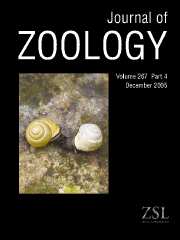Crossref Citations
This article has been cited by the following publications. This list is generated based on data provided by
Crossref.
Lewis, S.
Schreiber, E.A.
Daunt, F.
Schenk, G.A.
Wanless, S.
and
Hamer, K.C.
2004.
Flexible foraging patterns under different time constraints in tropical boobies.
Animal Behaviour,
Vol. 68,
Issue. 6,
p.
1331.
Cope, D. R.
Loonen, M. J. J. E.
Rowcliffe, J. M.
and
Pettifor, R. A.
2005.
Larger barnacle geese (
Branta leucopsis
) are more efficient feeders: a possible mechanism for observed body size—fitness relationships
.
Journal of Zoology,
Vol. 265,
Issue. 1,
p.
37.
Rizzolo, Daniel J.
Esler, Daniel
Roby, Daniel D.
and
Jarvis, Robert L.
2005.
Do Wintering Harlequin Ducks Forage Nocturnally at High Latitudes?.
The Condor,
Vol. 107,
Issue. 1,
p.
173.
Rizzolo, Daniel J.
Esler, Daniel
Roby, Daniel D.
and
Jarvis, Robert L.
2005.
Do Wintering Harlequin Ducks Forage Nocturnally at High Latitudes?.
The Condor,
Vol. 107,
Issue. 1,
p.
173.
Arzel, C.
Elmberg, J.
and
Guillemain, M.
2006.
Ecology of spring-migrating Anatidae: a review.
Journal of Ornithology,
Vol. 147,
Issue. 2,
p.
167.
Lewis, Tyler L.
Esler, Daniel
and
Sean Boyd, W.
2007.
Foraging Behaviors of Surf Scoters and White-Winged Scoters During Spawning of Pacific Herring.
The Condor,
Vol. 109,
Issue. 1,
p.
216.
Kirk, Molly K.
Esler, Daniel
and
Boyd, W. Sean
2007.
Foraging effort of Surf Scoters (Melanitta perspicillata) wintering in a spatially and temporally variable prey landscape.
Canadian Journal of Zoology,
Vol. 85,
Issue. 12,
p.
1207.
LEWIS, TYLER L.
ESLER, DANIEL
and
BOYD, W. SEAN
2008.
FORAGING BEHAVIOR OF SURF SCOTERS (MELANITTA PERSPICILLATA)AND WHITE-WINGED SCOTERS (M. FUSCA) IN RELATION TO CLAM DENSITY: INFERRING FOOD AVAILABILITY AND HABITAT QUALITY.
The Auk,
Vol. 125,
Issue. 1,
p.
149.
Baerwald, Erin F.
and
Barclay, Robert M. R.
2011.
Patterns of activity and fatality of migratory bats at a wind energy facility in Alberta, Canada.
The Journal of Wildlife Management,
Vol. 75,
Issue. 5,
p.
1103.
McCutcheon, C.
Dann, P.
Salton, M.
Renwick, L.
Hoskins, A. J.
Gormley, A. M.
and
Arnould, J. P. Y.
2011.
The foraging range of Little Penguins (Eudyptula minor) during winter.
Emu - Austral Ornithology,
Vol. 111,
Issue. 4,
p.
321.
Carrascal, Luis M.
Santos, Tomás
Tellería, José L.
and
Nogues-Bravo, David
2012.
Does Day Length Affect Winter Bird Distribution? Testing the Role of an Elusive Variable.
PLoS ONE,
Vol. 7,
Issue. 2,
p.
e32733.
Santiago-Quesada, Francisco
Masero, José A.
Estrella, Sora M.
and
Sánchez-Guzmán, Juan M.
2012.
Persistent bimodal activity patterns in wild and captive black-tailed godwit Limosa limosa under different environmental conditions.
Behavioral Ecology and Sociobiology,
Vol. 66,
Issue. 3,
p.
397.
Zhang, Yong
Prins, Herbert H. T.
Versluijs, Martijn
Wessels, Rick
Cao, Lei
de Boer, Willem Frederik
and
Wang, Rui-Wu
2016.
Experimental Evidence Shows the Importance of Behavioural Plasticity and Body Size under Competition in Waterfowl.
PLOS ONE,
Vol. 11,
Issue. 10,
p.
e0164606.
Sharpe, David J.
and
Goldingay, Ross L.
2018.
Time budget of the squirrel glider (Petaurus norfolcensis) in subtropical Australia.
Australian Journal of Zoology,
Vol. 66,
Issue. 4,
p.
251.
Wood, Kevin A.
Hilton, Geoff M.
Newth, Julia L.
and
Rees, Eileen C.
2019.
Seasonal variation in energy gain explains patterns of resource use by avian herbivores in an agricultural landscape: Insights from a mechanistic model.
Ecological Modelling,
Vol. 409,
Issue. ,
p.
108762.
Zhu, Zhengrong
Zhou, Lizhi
Yu, Chao
Cheng, Lei
Xu, Wenbin
and
Song, Yunwei
2020.
Do Geese Facilitate or Compete with Wintering Hooded Cranes (Grus monacha) for Forage Resources?.
Diversity,
Vol. 12,
Issue. 3,
p.
105.
Mott, Rowan
Prowse, Thomas A. A.
Jackson, Micha V.
Rogers, Daniel J.
O'Connor, Jody A.
Brookes, Justin D.
and
Cassey, Phillip
2023.
Measuring habitat quality for waterbirds: A review.
Ecology and Evolution,
Vol. 13,
Issue. 4,
Liu, Yangfan
Kjær, Lene Jung
Boklund, Anette Ella
Clausen, Preben
Nyegaard, Timme
Ward, Michael P.
Laffan, Shawn
and
Kirkeby, Carsten Thure
2025.
The role of wild birds in transmitting highly pathogenic avian influenza in Denmark: An exploration using a spatiotemporal model.
Ecological Modelling,
Vol. 501,
Issue. ,
p.
111019.


